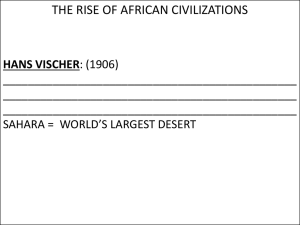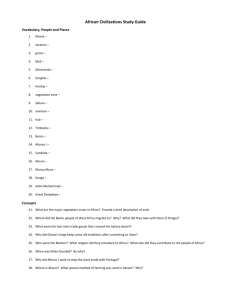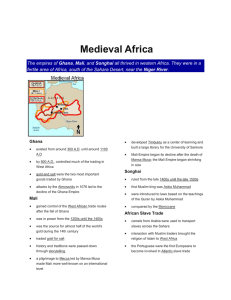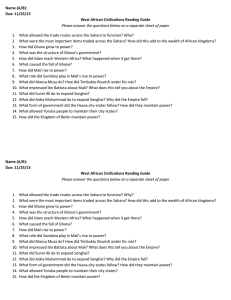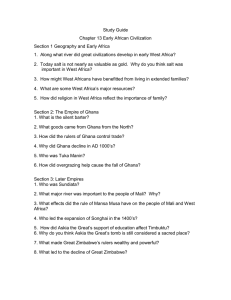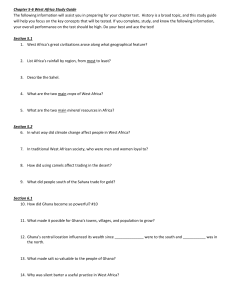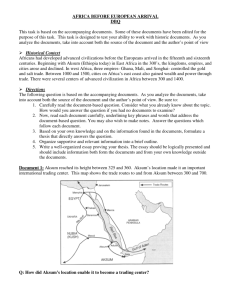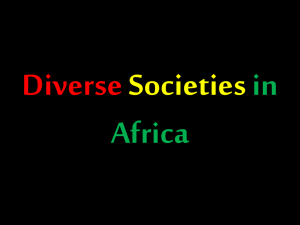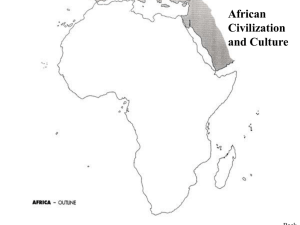for Unit 3: African Civilizations, Societies and Empires
advertisement
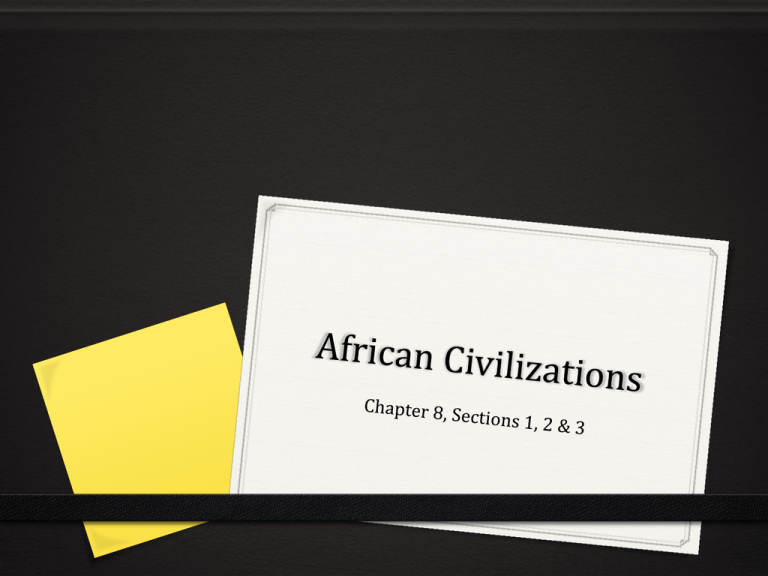
Sahara 0 Sahara covers an area roughly size of the USA. 0 Small part dunes; rest flat gray wasteland consisting of rocks and gravel. Sahel 0 Each year the desert takes over more and more land at the southern edge of the Sahara Desert. Savanna 0 Grassy plains; includes mountainous highlands and swampy tropical stretches. 0 Covers 40% of continent. 0 Only two seasons – dry and rainy. Animism 0 Belief systems helped Africans organize and understand information about their world. 0 Spirits play important role in regulating life. 0 Spirits are present in animals, plants and other natural forces. Griot 0 Few African societies have a written language; history shared orally by storytellers called griots. The Nok Culture 0 Earliest known culture in West Africa. 0 Nigeria 500 B.C. - 200 A.D. 0 First West African culture to smelt iron to make tools and weapons. 0 Traded tools and weapons. Djenne-Djeno 0 Ancient Mali city discovered in 1977. 0 Dates back to 250 B.C. 1400 A.D. 0 Located on tributary of Niger River in West Africa. 0 Artifacts include pottery, clay toys, glass beads, stone bracelets, etc. Migration 0 Bantu-speaking peoples. 0 For about 1,500 years small groups of people moved to southern parts of Africa Following Congo River. 0 Settled in savannah area south of the Sahara (southeastern Nigeria). Push-Pull Factors PUSH PULL Bantu Speaking People 0 Bantu-speaking people did not always move into unpopulated areas; clashes occurred; smaller groups (San and BaMbuti) were conquered. 0 Bantu brought new and exchanged agricultural techniques, technology, and ideas about government to invaded areas. Aksum 0 Kingdom of Aksum located along plateaus of the Red Sea and south of Kush; now Eritrea and Ethiopia. Adulis 0 Aksum provided access to Mediterranean Sea and Indian Ocean; chief seaport called Adulis. 0 Crowded with traders from Egypt, Arabia, India and Roman Empire. 0 Merchants traded a variety of goods. Ezana 0 Aksum reached height 325 – 360 A.D. under Ezana. 0 First conquered what is known today as Yemen; then conquered Kush and Meroë (today Sudan). Ezana Meroë Terraces 0 Aksumites adapted farming to hilly environment by building terraces. 0 Step-like ridges on mountain slopes helped soil retain water and prevented it from being washed away. Lineage 0 Way many African families are organized. 0 Believe they are descendants of a common ancestor. 0 Lineage includes spirits of ancestors and future generations. Stateless Societies 0 Societies where lineage groups took the place of rulers; no centralized system of government. 0 Balance of power lay between lineages of equal power. 0 Disputes settled by elders from various lineages. Patrilineal 0 Members of patrilineal society trace ancestors through their fathers. 0 Inheritance passes from father to son. 0 When a son marries, his wife and children remain part of father’s extended family. Matrilineal 0 Members of matrilineal society trace ancestors through their mothers. 0 Young men inherit land and wealth from mother’s family. 0 Men usually still hold positions of authority. Maghrib 0 Area in North Africa ruled by Muslims. 0 Includes Mediterranean coast of Libya, Tunisia, Algeria and Morocco. Berbers 0 Original inhabitants of North Africa. 0 Converted to Islam while maintaining Berber identities and loyalties. 0 Two groups – Almovarids and Almohads – united Maghrib under Muslim rule. Almoravids 0 Muslim brotherhood - began 11th Century. 0 Spread Islam in Morocco 0 Captured Ghana in West Africa 0 Captured areas of Spain (known as Moors) Almohads 0 Berber Muslim reformers who seized power from the Almoravids in mid1100’s. 0 United Maghrib under one rule for about 100 years. Ancient African Kingdoms Ghana 0 Trade routes crossed an area farmed by Soninke people; called their ruler ghana. 0 Word came to represent Soninke region. 0 Ghana became rich kingdom in 700’s trading gold and salt. Mali 0 People came from the area south of Ghana. 0 Seized power from weakened Ghana around 1235. Sundiata 0 Mali’s first great leader. 0 Came to power after crushing cruel and popular leader; became emperor. 0 Strong leader in war and peace; made important changes in government and finances. Mansa Musa 0 Mali ruler 1312 – 1332. 0 Followed series of seven rulers after Sundiata’s death; time of turmoil. 0 Mansa Musa put down rebellions, expanded empire and brought effective government to area. Ibn Battuta 0 Traveler and historian from Tangier in North Africa; travelled 27 years before visiting Mali. 0 Criticized leaders for not practicing Islam code more strictly. Songhai 0 After decline of Mali, groups broke away, among them Songhai people in east. 0 Built up area and extended territory, gaining control over important trade routes. Hausa 0 Group of people named after the language they spoke. 0 Created several citystates in today’s northern Nigeria 1000 1200 A.D. 0 Fighting amongst citystates prevented Hausa from becoming an empire. Yoruba 0 Group of people with common language. 0 Consisted of small, independent communities; joined together to form powerful kingdom. 0 King considered highest spiritual authority. Benin 0 Kingdom situated to south and west of Ife, near delta of Niger River. 0 Under oba (king) Ewuare became major state in West Africa. 0 Walled city with broad streets and houses; huge palace with artworks. Swahili 0 Language spoken on east coast of Africa. 0 Combination of Arabic and Bantu languages. Great Zimbabwe 0 City in southeastern Africa between Zambezi and Limpopo rivers. 0 Established by Shona people. 0 Grew into an empire built on gold trade 1200 – 1400. Mutapa 0 State started by Mutota, who left Great Zimbabwe about 1450. 0 Dominated Shona people and forced them to make payments. 0 Start of what became Mutapa Empire. 0 Eventually displaced by the Portuguese.
